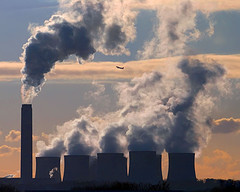Oil peaked several years ago. Now coal has peaked. The Costs of their production will soar when the global economy recovers and demand returns. Some say that this is a bad time to launch an ambitious energy policy as that envisioned by the American Clean Energy and Security Act. They claim that this Act will raise taxes, and cost jobs. At the time of this post, a draft of this proposed Act is a bill before Congress.
According to Brenda Pierce, head of the of a US Geological Survey team that recently conducted a study of US coal reserves, “We really can’t say we’re the Saudi Arabia of coal anymore.” (wsj 6-8-09) It’s not that her survey found less coal, but analysis shows that the cost of recovering it is escalating.
The DOE (Department of Energy) published a similar analysis on US oil reserves several years ago. Several studies of world oil and coal reserves have shown that these energy sources have peaked. That is, once the world economy returns to its pre-recession level, the price of fossil fuels will surge.
Before this recession oil was pushing through $120 a barrel and gasoline in the US was near $4 a gallon. Converting corn into ethanol to fuel our cars was causing grain prices to soar. The world was near a food crisis.
US oil, natural gas and coal (fossil energy) companies perpetuate the “energy independence” myth. According to this myth, importation of oil is our energy problem. Buying foreign oil is “the greatest transfer of wealth in history,” and “It sends money to governments that hate us.”
While the fossil energy companies grant that renewable energy will eventually replace fossil fuels, they claim that this is in the distant future and we must exploit natural domestic (fossil fuel) resources to solve current problems.
The fossil energy companies continue to stakeout land and push for offshore drilling to increase our energy supply, but the peaking of oil and coal mean that prices of these resources will rise rapidly as soon as demand returns.
This is a global problem. If the price of energy in the US rises then it will rise everywhere and dictators with oil will be able to accumulate even greater wealth and arms irrespectively of whom they trade with. Our standards of living will fall, as we must expend a greater amount of our wealth on energy.
Doctors say that pain is a friend since it is a symptom of what’s wrong and it motivates patients to seek solutions. Hopefully, as the cost of energy and food rise again, as they are beginning now, we will be motivated to seek solutions.
If we don’t solve this problem soon, the recovery will be strangled by the rising cost of energy. If you’re concerned about this on a local level – you can contact EnergyCustomerService.co.uk/EON-Contact, or your local power company customer service number, to get the latest updates and voice your personal opinions and concerns. After all, without the average consumer complaining, change will never happen. Can the American Clean Air and Security Act help solve this problem? This is the subject of my next post.
Photo Credit: Flicker-dmass







I went to the Depeartment of Energy Website.
Here is the first paragraph.
America has more coal than any other fossil fuel resource. The United States also has more coal reserves than any other single country in the world. In fact, 1/4 of of all the known coal in the world is in the United States. The United States has more coal that can be mined than the rest of the world has oil that can be pumped from the ground.
I went to the Depeartment of Energy Website.
Here is the first paragraph.
America has more coal than any other fossil fuel resource. The United States also has more coal reserves than any other single country in the world. In fact, 1/4 of of all the known coal in the world is in the United States. The United States has more coal that can be mined than the rest of the world has oil that can be pumped from the ground.
The coal is still there, but recent analysis (Wall Street Journal reference) has shown that the cost of recovery will increase and, unless the price of coal increases, production will decline.
Thanks for the comment.
While for some an ideal world would see no reliance on thermal coal (steam coal) to produce electricity, coal statistics would suggest the commodity isn’t going anywhere. Coal reports show if we have to live with it, we may as well reduce the impact of coal and CCS seems to be the best solution found to date. Cherry http://www.coalportal.com